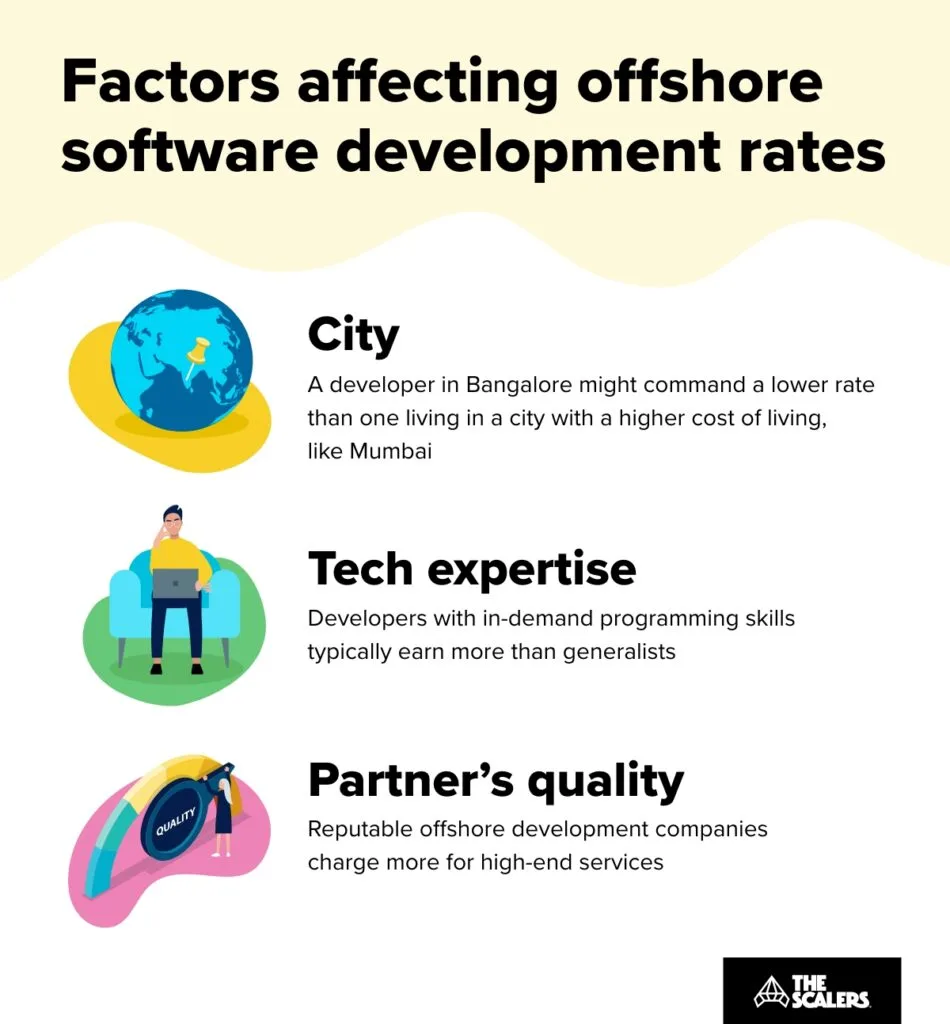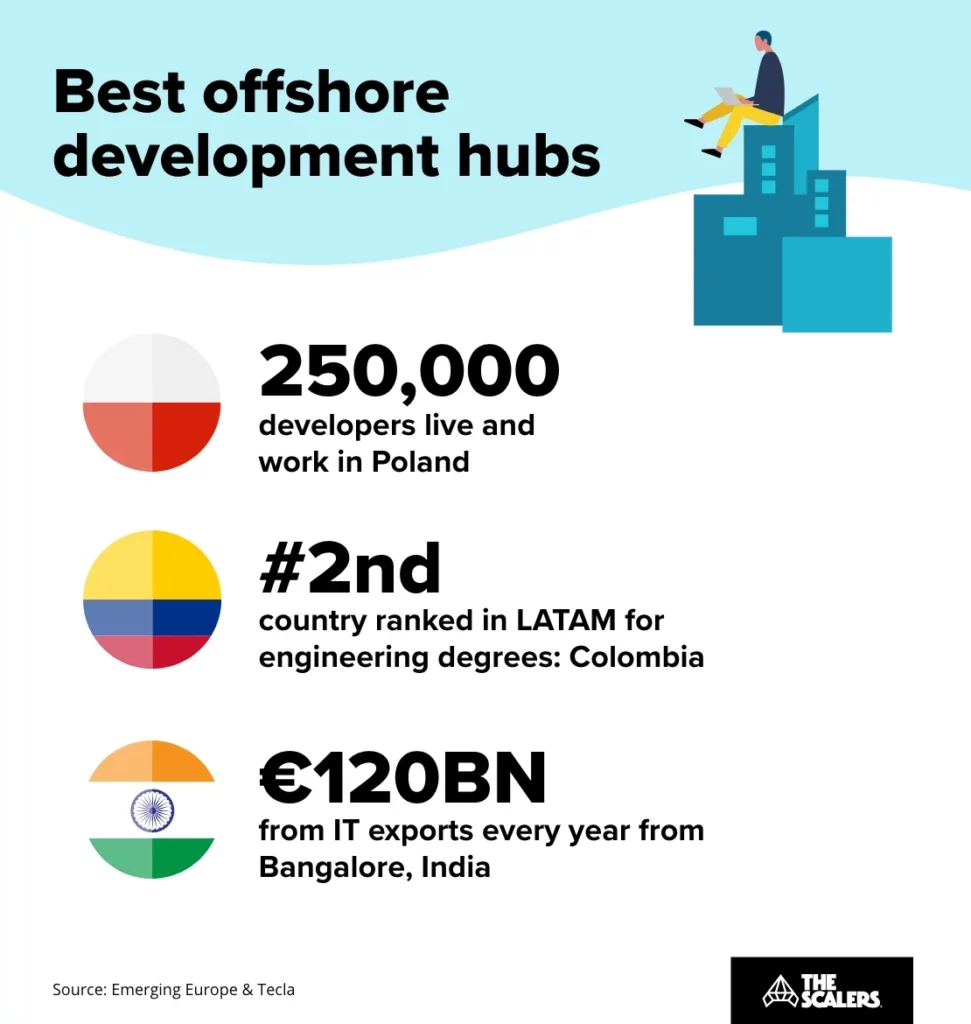Offshore software development rates by country in 2025: Top locations

Cost-cutting is one of the main reasons organisations move software development operations abroad and build offshore teams in countries like India or the Philippines.
But what’s the real cost of offshoring? Is it only about location? What else drives the price differences from one place to another?
In this guide, we’ll compare offshore software development rates by country, focusing on top destinations with elite engineering talent. By the end, you’ll understand what affects these costs and how rates differ between one region and another.
A quick look at the offshore software development rates by country
The table below shows the hourly rates software developers command in popular offshoring destinations, including India, Poland, Colombia, and Egypt.
| Region | Countries | Junior developer | Senior developer | Average rate |
| Eastern Europe | Poland and Ukraine | $30/h | $58/h | $44/h |
| Latin America | Colombia and Mexico | $25/h | $55/h | $40/h |
| Asia | India and the Philippines | $20/h | $50/h | $35/h |
| Africa | Egypt and Nigeria | $20/h | $45/h | $32.5/h |
Source: Upwork, Arc.dev, and PayScale (2025).
Later in this article, we’ll analyse, in depth, every location, but first let’s see what aspects affect offshore development rates.

offshoring that works
See how a top-rated meal delivery service finally got a properly distributed team
DOWNLOAD CASE STUDYWhat are the factors affecting offshore software development rates?
The most critical factor determining offshore software development rates is the country where developers are based, but it’s not the only one. Engineers’ tech stack and even the city they live in can impact the overall cost.

The city where offshore developers live and work
Organisations that leverage offshore software development benefit from large talent pools and lower costs in offshoring locations compared to their home countries. However, software development rates can vary between major and smaller cities.
For example, hiring engineers in Mumbai may cost more than in Bangalore. The higher cost of living in Mumbai drives up rates, while Bangalore offers better value for your money, often with more specialised engineers.
The offshore developers’ tech expertise
Developers’ rates depend on their tech expertise, programming languages, and the frameworks they specialise in.
If you want to hire offshore developers with in-demand skills, you must invest more than in a standard engineering team. Developers skilled in multiple disciplines will always command a higher wage relative to their location and specialisation.
For example, hiring a front-end developer to build an app will typically cost less than hiring a developer who’s an expert in applying machine learning and artificial intelligence.
The quality of the offshore development company
An offshore development partner that sources top developers and has decades of experience building tech teams will likely offer engineers at higher rates than a less established company.
However, these rates reflect the quality of talent and delivery. In the long run, you often get more cost-effective operations thanks to higher productivity, better output, and lower turnover.
Deep dive: Offshore software development rates by country in 2025
Now that we’ve covered the factors that influence offshore development rates, let’s dive into the most popular countries and regions, examining what they offer in terms of talent and cost.

Offshore software development rates in Eastern Europe
Two countries come to mind when talking about software development and elite engineering talent in Eastern Europe: Poland and Ukraine.
Polish and Ukrainian developers are known for their hard work ethic and project commitment. According to Clutch, 4,800+ custom software development companies offer premium services in Eastern Europe.
| Country | Number of developers | Top tech hubs | Average hourly rates |
| Poland | 600,000 | Warsaw and Kraków | $40–$56 |
| Ukraine | 250,000 | Kyiv and Lviv | $25–$40 |
Poland
Poland has emerged as a prime destination for foreign investments and offshore software development due to its strategic location, advanced infrastructure, legal and political stability, and a large pool of skilled talent.
Most firms and engineers are based in three tech hotspots:
- Warsaw. The capital and largest city in the country hosts numerous tech companies and startups.
- Kraków. A significant IT centre with a strong academic presence and a growing number of tech firms.
- Wroclaw. Known for its vibrant tech scene and a high concentration of IT specialists.
The software development hourly rates in these cities range from $40/h to $56/h.
Pros of offshoring to Poland
- Polish developers are among the most skilled specialists in Europe.
- Work culture is highly compatible with Western organisations.
- There’s full-time zone alignment with most Western European countries and partial overlap with the US.
Cons of offshoring to Poland
- Developer salaries are steadily rising.
- Local currency and inflation fluctuations can impact cost planning.
Ukraine
Ukraine has established itself as a top offshore destination with a large and experienced tech workforce. Kyiv is the country’s capital city and a major tech hub with thousands of engineers, while Lviv is a leading IT centre in the west of the country with a strong outsourcing and offshoring culture.
The offshore software development rates in Ukraine go from $25/h to $40/h.
Pros of offshoring to Ukraine
- Developers offer strong skills at competitive rates.
- English is widely spoken in the tech community.
- There’s a large, fast-growing tech ecosystem.
Cons of offshoring to Ukraine
- Ongoing geopolitical tensions and current armed conflict can pose risks to business continuity.
- In some regions, infrastructure may not meet Western standards.

Discover how to scale development teams in 2023 and beyond
DOWNLOAD EBOOKOffshore software development rates in Latin America
Latin America is becoming a go-to destination for offshoring tech operations due to its mix of skilled developers, competitive rates, and proximity to the US. Colombia and Mexico are among the best software development countries to hire top talent in the region.
| Country | Number of developers | Top tech hubs | Average hourly rates |
| Colombia | 150,000 | Bogotá and Medellín | $25–$45 |
| Mexico | 500,000 | Guadalajara and Monterrey | $30–$50 |
Colombia
Colombia is slowly becoming a trendy destination for tech investors. Especially Medellín. This vibrant city is a hub for innovation. In 2022, it was named the first Special District of Science, Technology, and Innovation in Colombia.
Since its designation, local and foreign companies that invest in Medellín have had tax, financial, and administrative advantages.
The offshore software development rates in Colombia go from $25/h to $45/h.
Pros of offshoring to Colombia
- The country offers a favourable business environment with tax incentives for tech companies.
- Colombia shares a similar time zone with major US cities, facilitating real-time collaboration.
Cons of offshoring to Colombia
- The talent pool may be limited in specialised tech fields.
- Language barriers can exist, although many developers are proficient in English.
Mexico
Alongside Colombia, Mexico is a key tech enclave in Latin America. Monterrey, the country’s industrial capital, has a talent pool of 100,000+ high-skilled engineers ready to embark on international projects.
The offshore software development rates in Mexico go from $30/h to $50/h.
Pros of offshoring to Mexico
- Proximity to the US allows for easy travel and time zone alignment.
- The country has a robust tech infrastructure and a growing startup scene.
Cons of offshoring to Mexico
- Competition for top talent can drive up salaries.
- Some areas may experience political or social unrest.
Offshore software development rates in Asia
Companies that choose to offshore to India and the Philippines gain access to cost-effective, skilled developers.
While time zone differences and geographical distance may pose challenges for some organisations, the ability to tap into a vast talent pool with diverse technical skills remains a significant draw.
| Country | Number of developers | Top tech hubs | Average hourly rates |
| India | 5.8 million | Bangalore and Hyderabad | $20–$50 |
| The Philippines | 190,000 | Manila and Cebu City | $20–$40 |
India
India is not only an excellent offshore software development destination but also a well-known leader in the IT industry. The country is home to giant tech corporations such as HCL Technologies, and a whopping 1.5 million new engineers join the workforce each year.
Bangalore, known as the Silicon Valley of Asia, is India’s most important tech hub. Google and Amazon, among others, have Research and Development Centres (R&D Centers) in the city.
The offshore software development rates in India go from $20/h to $50/h.
Pros of offshoring to India
- India has a well-established tech ecosystem and infrastructure.
- There’s a massive talent pool of highly skilled specialists.
- Developers possess a high English proficiency.
- India’s time zone (UTC +5:30) offers overlapping working hours with Europe, Australia, and the US.
Cons of offshoring to India
- Geographical distance from Western countries and cultural barriers can affect communication and collaboration without effective processes in place.
- Talent quality can differ greatly when working with an unreliable offshore partner.

The Philippines
The Philippines is another big name in the Asian tech scene. Companies searching for engineers in the region often benefit from the most competitive rates on the continent.
But such affordability comes at a trade-off. The talent pool in the Philippines is smaller compared to India or China, and Filipino developers aren’t as specialised in emerging and niche technologies as their counterparts in other Asian countries.
The offshore software development rates in the Philippines go from
Pros of offshoring to the Philippines
- The Philippines offers some of the lowest rates in Asia for software development.
- English is an official language, and developers have a very high proficiency in it.
Cons of offshoring to the Philippines
- Limited talent pool.
- Lack of deep technical expertise in advanced technologies and frameworks.
Offshore software development rates in Africa
African talent flourishes in the North and the West, with Egypt and Nigeria shining as exceptional tech hubs. Still, not as popular as India, Poland, or Colombia, African countries are growing as serious contenders to the more traditional offshoring destinations.
| Country | Number of developers | Top tech hubs | Average hourly rates |
| Egypt | 250,000 | Cairo and Alexandria | $20–$35 |
| Nigeria | 220,000 | Lagos and Abuja | $25–$40 |
Egypt
European companies that choose to offshore software development to Egypt are attracted by its favourable time zone, skilled workforce, and proximity to the continent. Cairo, in particular, has become a magnet for global tech firms and innovation hubs.
The Digital Egypt Vision for Offshoring Industry 2022-2026 report outlines why Egypt is fast becoming a strategic location for tech investments:
- There’s a large multilingual talent pool fluent in English, German, French, Italian, Spanish, and other European languages.
- Over 35% of university graduates come from STEM disciplines.
- Egypt is 20–30% more cost-effective than Eastern European offshoring destinations.
A good proof of its affordability compared to a top offshoring country like Poland is its offshore software development rates — from $20/h to $35/h, which can be up to 50% lower.
Pros of offshoring to Egypt
- Lower costs than in other locations.
- Good level of English and other European language proficiency.
- Time zone proximity to European markets.
Cons of offshoring to Egypt
- Some instability in economic and political conditions.
- Not all offshoring partners operate at international quality standards.
- Legal frameworks still maturing in areas like data protection.
Nigeria
Nigeria’s high number of skilled, fluent English developers is an attractive prospect for many US and UK companies. This growing pool of talent is further supported by a vibrant startup ecosystem. Nigeria is home to five out of the nine tech unicorns in Africa, most of them FinTechs.
The offshore software development rates in Nigeria go from $25/h to $40/h.
Pros of offshoring to Nigeria
- Young and ambitious talent pool.
- Fluent English-speaking developers.
- Competitive rates and a growing tech ecosystem.
Cons of offshoring to Nigeria
- Varying levels of developer experience and specialisation.
- Less established offshoring track record.

Increase innovation and deliver at speed in the Silicon Valley of Asia
LEARN MOREWhy choose The Scalers as your offshore development partner?
If you’ve read this far, odds are you’re looking to build an offshore tech team. Maybe you’ve already decided to do it in a talent-rich country like India but are still yet to decide on which development partner to choose.
At The Scalers, we specialise in building dedicated development teams in Bangalore, India, sourcing the top 1% of engineering talent in the region. We’ve built over 100 tech teams in the past decade for organisations of multiple sizes and industries.
For example, we helped Preqin, a UK FinTech, scale to a 450+ person R&D Centre in Bangalore with engineers that were crucial in launching a flagship product.
Preqin wanted engineers who felt like a true extension of their London team, instilled with their DNA, using the same systems and processes, and fully integrated into their global operations. We ensured the team and setup reflected this vision.

If you want to know how we can help you build a team that’s culturally aligned with your business, get in touch and let’s talk about your unique needs and tech requirements. One of our senior executives will send you a tailored proposal shortly.
In summary
Going offshore opens a literal world of options (and price points) for where to hire developers. Engineers from countries like India and the Philippines offer some of the most cost-effective development rates, with averages around $35/h.
India, in particular, stands out as a frontrunner for offshore software development, thanks to its vast talent pool of highly skilled specialists.

If you want to learn more about offshoring and insights on building tech teams, read one of our guides and articles on related topics. You can find them right below!















